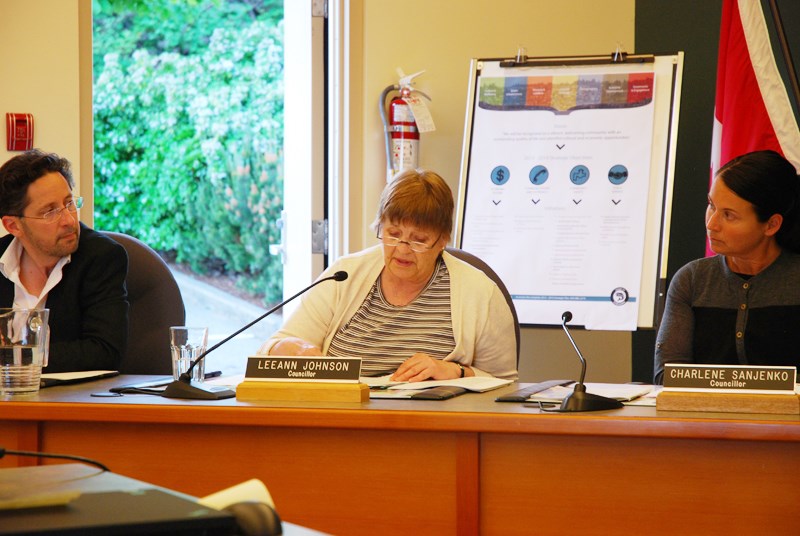Proposed changes to the Town of Gibsons’ affordable housing policy came under intense scrutiny last week, with two councillors and resident Dorothy Riddle expressing strong reservations about staff’s recommendations.
“I have to say I’m a bit dismayed by the policy proposed by staff,” Riddle, a certified management consultant, said during the first inquiries session at council’s May 13 committee of the whole meeting.
Riddle said the wording changes proposed in a planning report would weaken the rules by “encouraging” instead of “requiring” developers to contribute funds or affordable units, and she questioned how the Town would protect and expand its affordable housing stock in that way.
In his report, director of planning André Boel recommended the Town move toward a density bonus system, setting a base density above which amenity contributions would be requested at an increasing rate in proportion to the rise in density, up to a maximum.
The approach was highlighted by the province in a best practices guide for municipalities, Boel said, adding that the replacement of “require” with “encourage” in the policy manual was recommended for legal reasons.
He also suggested the Town specify in its current policy that the price of affordable housing be at least 10 per cent lower than the market value of the unit and that cash-in-lieu contributions fall between $25,000 and $75,000.
Coun. Lee Ann Johnson said she, too, was “quite dismayed” by some of the recommendations, saying there was “too narrow a gap” between the sale price and market value and that the range for cash contributions “doesn’t make sense,” as the developer would claim that the smaller amount is all he could afford.
“You’ve set the ceiling not the floor,” Johnson said. “That’s the price of a car, a cheap car.”
Johnson said she also had difficulty with “encouraging” rather than “requiring” contributions from developers.
“Require has some teeth,” she said. “In Vancouver when they do density bonusing they require it, and they require it in square feet.”
Coun Dan Bouman concurred. “Imprecise language like ‘encourage’ leads to absolutely nothing,” he said.
On charging at least 10 per cent below market value, Bouman said some communities set the rate at 50 per cent.
“The problem is, 10 per cent is not enough of a mark-down,” he said. “It has to be a better deal.”
CAO Mani Machado said the wording changes were recommended by the provincial best practices guide, but staff would “go back and double-check our standing.”
In response to other criticisms, Boel said that for many years the Town and developers could not agree on a price point.
“The Town was seeking 20 to 30 per cent [below market value], and that didn’t fly with the developer,” he said.
Boel also noted the Town does not have the same powers as the City of Vancouver, which operates under its own charter.
“We also don’t have developers knocking on our door to build, offering affordable housing,” Boel said.
He said the change in direction he proposed could bring in money for affordable housing and the cash contributions would have to be determined on a case-by-case basis.
While acknowledging the figure of $25,000 “maybe shouldn’t be there,” he also said the District of Sechelt, when he worked in its planning department, set $200,000 for cash-in-lieu contributions for a period of time, “but no one took us up on it.”
Coun. Charlene SanJenko thanked staff for agreeing to review the need for the proposed wording changes, and noted the Town’s efforts to draft a new policy were in lockstep with an updated housing study presented at the same meeting by Matt Thomson, coordinator of the Sunshine Coast housing committee.
“I would like to say that I think great strides are being made between what Matt and the community are doing and what our staff is doing,” SanJenko said.
During the discussion, Mayor Wayne Rowe said he agreed with making the option of dedicated units or cash-in-lieu available to applicants.
“We have 11 units now, but we still don’t have one built or occupied,” he said.
At Rowe’s suggestion, the matter was deferred to a future meeting.
In one of the housing committee report’s key findings, Thomson said home ownership is generally unaffordable on the Coast even for households earning median income.
“While couples with children tend to have the highest median income in most Sunshine Coast communities, there remains a significant gap between median dwelling values and median purchasing power for a single-family home in all communities except Sechelt,” the report said.
Between 2001 and 2011, it said, median income on the Coast rose by 39 per cent to $55,708, but the cost of housing increased more than 130 per cent during the same period.



